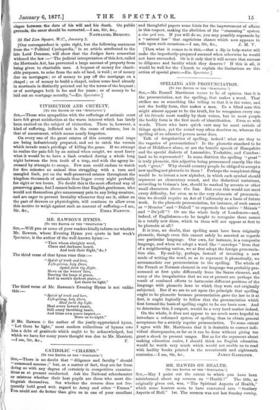SPELLING AND PRONUNCIATION.
[TO THE EDITOR OF THE "SPECTATOR."]
Sm,—Mr. Russell Martineau seems to be of opinion that it is the pronunciation, not the spelling, that makes a word. That strikes me as something like telling us that it is the voice, and not the bodily form, that makes a man. To a blind man this might almost appear to be the truth, for he recognises every one of his friends most readily by their voices, but to most people the bodily form is the first mode of identification. Even so with words. Those who have quick ears may be most certain of things spoken, yet the sound very often deceives us, whereas the spelling of an educated person never does.
Talk of irregularities of spelling, indeed ! what are they to the vagaries of pronunciation? Is the phonetic standard to be that of Middlesex alone, or are the bucolic speech of Hampshire and the special dialects of Lancashire, Yorkshire, and Cumber- land to be represented? In some districts the spelling " great " is truly phonetic, this adjective being pronounced exactly like the verb "greet." Why should country people be obliged to accept a new spelling not phonetic to them ? Perhaps the completest thing would be to invent a new alphabet, in which each symbol should represent an elementary sound, and the dialectical variations, according to Grimm's law, should be marked by accents or other small characters above the line. But even this would not meet every difficulty, for even as to the very elements of pronuncia- tion we should require an Act of Uniformity as a basis of future work. Is the phonetic pronunciation, for instance, of such names as " Menzies " and " Dalzell " to supersede the native " M4nnis " and " Da'yell "? Or are the whole body of Londoners—and, indeed, of Englishmen—to be taught to recognise these names in a totally new dress, which to them will not appear at first to be phonetic at all ?
It is true, no doubt, that spelling must have been originally phonetic, though even this cannot safely be asserted as regards one particular language. Our own, for instance, is a composite language, and when we adopt a word like "envelope "from that of a neighbouring nation, we at first adopt the foreign pronuncia- tion also. By-and-by, perhaps, instead of inventing a new mode of writing the word, so as to represent it phonetically, we accommodate our pronunciation to the spelling. The whole of the French or Norman element in our language was probably pro- nounced at first quite differently from the Saxon element, and many of the irregularities that we see at present are perhaps the result of confused efforts to harmonise different portions of the language with phonetic laws to which they were not originally subjected. But if we are to act upon the principle that spelling ought to be phonetic because pronunciation gave the law to it at first, it ought logically to follow that the pronunciation which first formed the basis of spelling ought to be our basis now. And to determine this, I suspect, would be a very hard matter indeed.
On the whole, it does not appear to me much more hopeful to introduce a reformed system of spelling, than to obtain general acceptance for a strictly regular pronunciation. To some extent I agree with Mr. Martineau that it is desirable to correct indi- vidual discrepancies, as far as it can be done without giving too great a shock to present usages. But as for the argument about making education easier, I should think no English education would be worth very much which would not enable us to read with facility books printed in the seventeenth and eighteenth









































 Previous page
Previous page